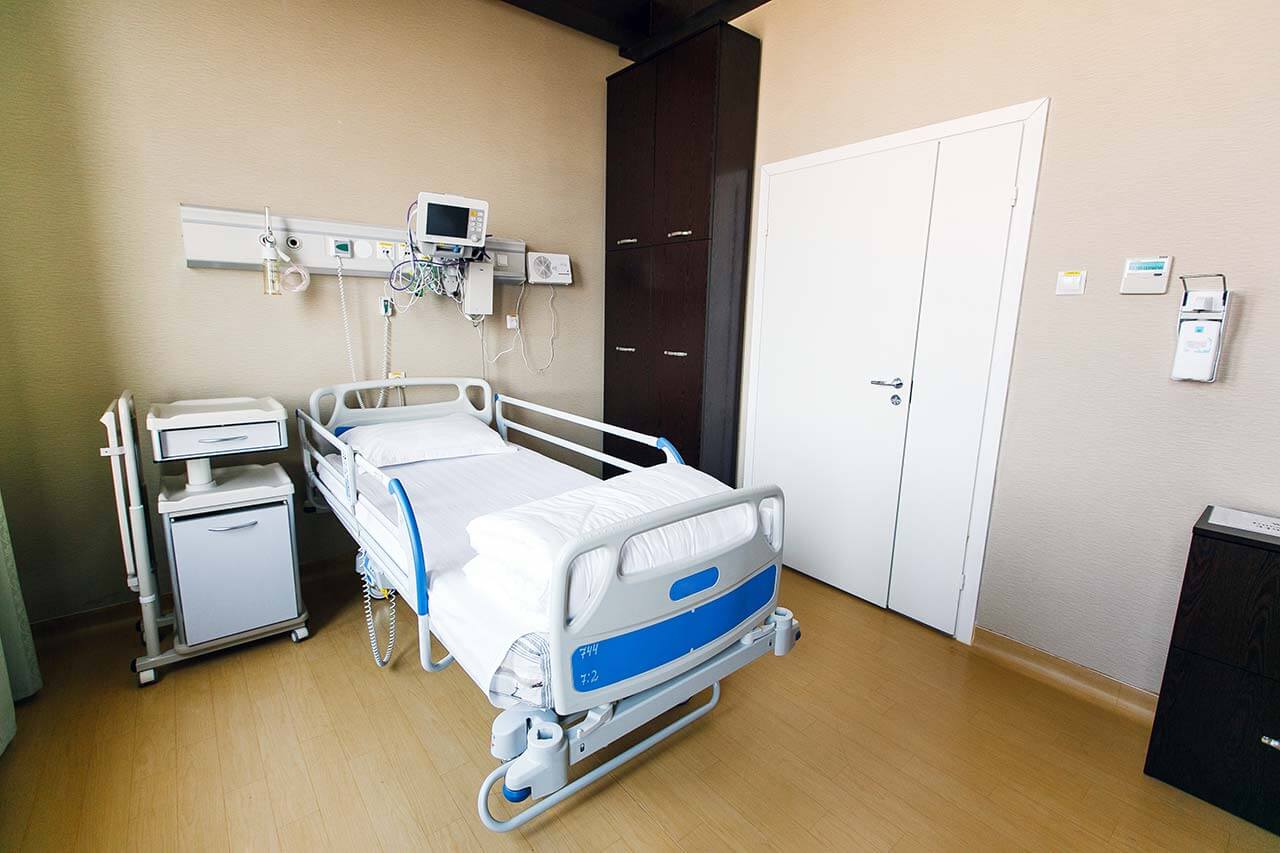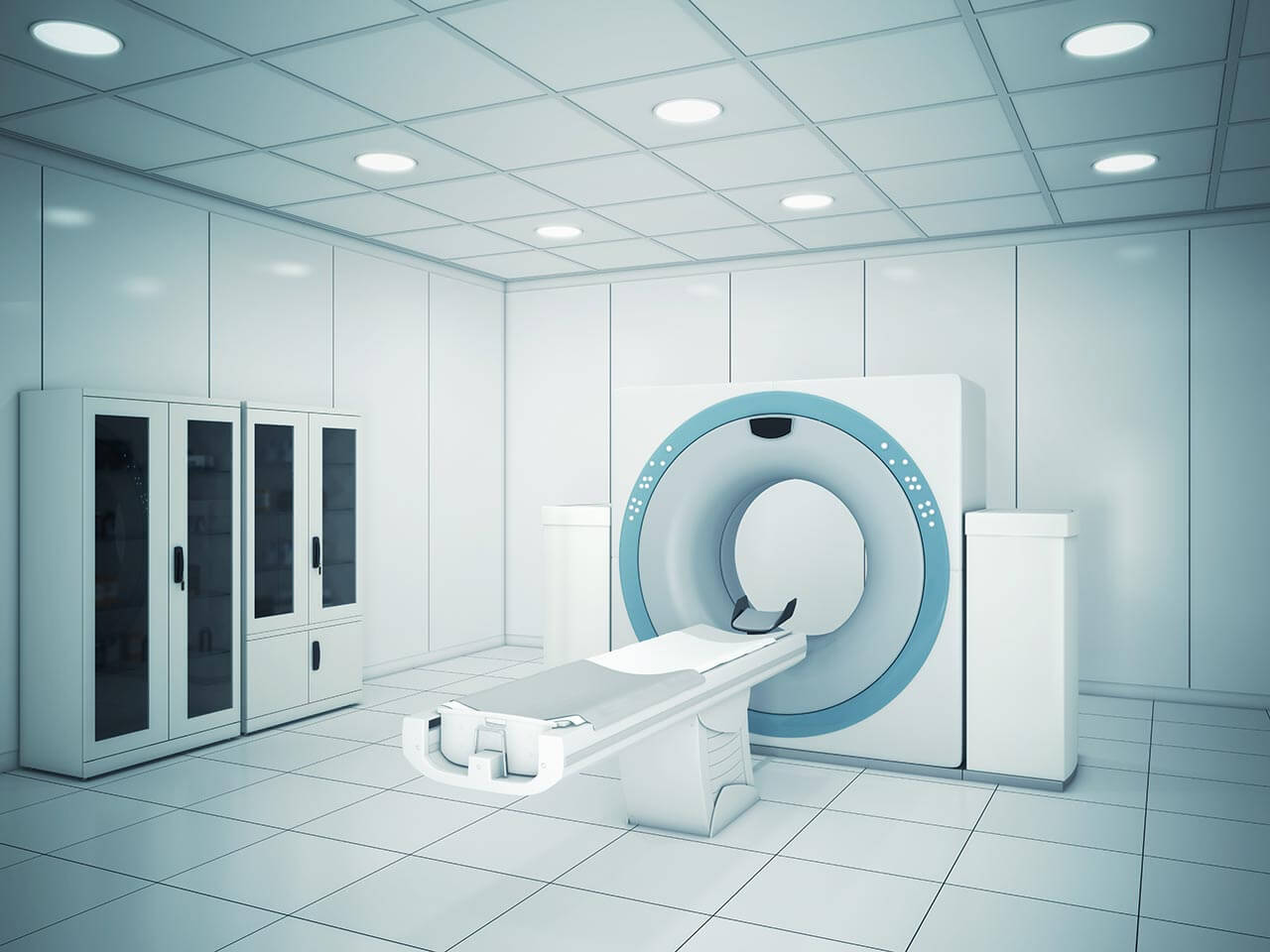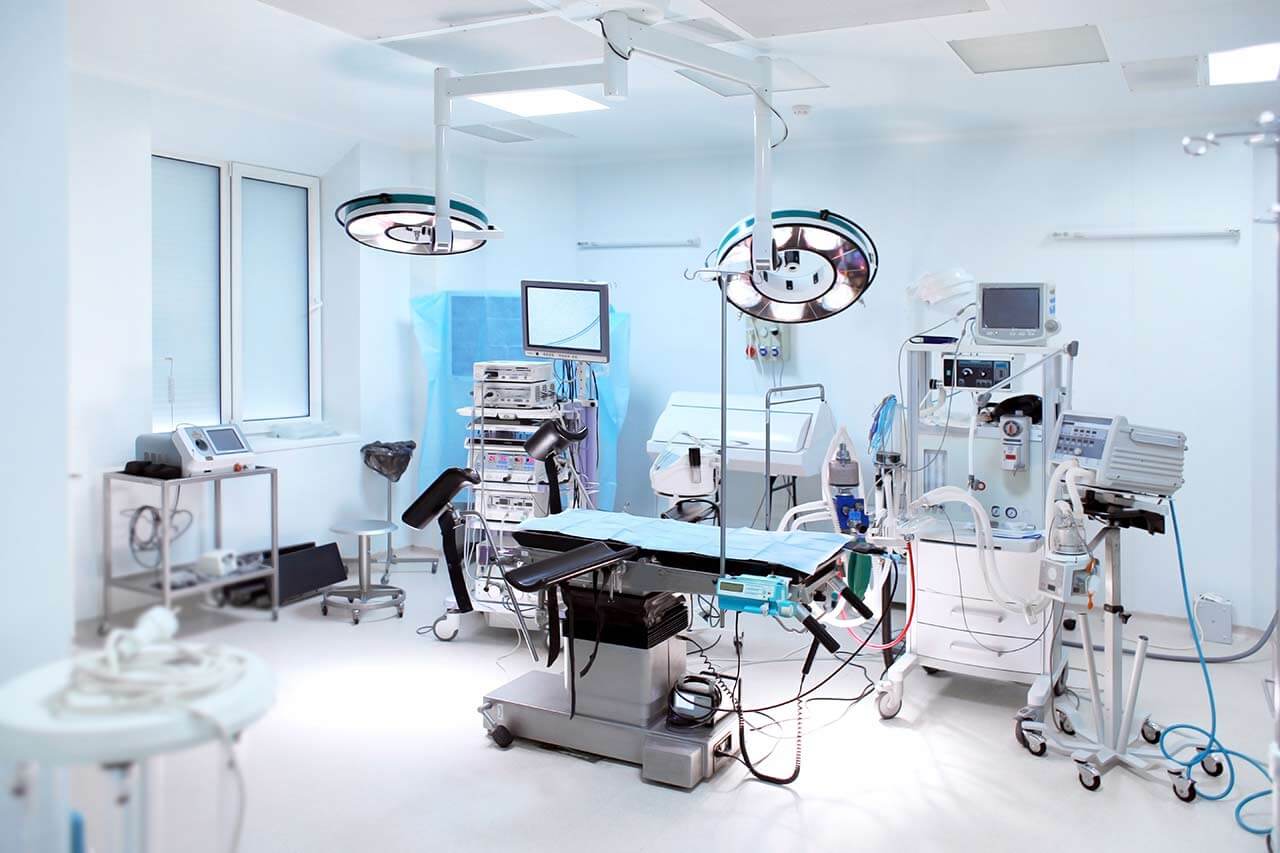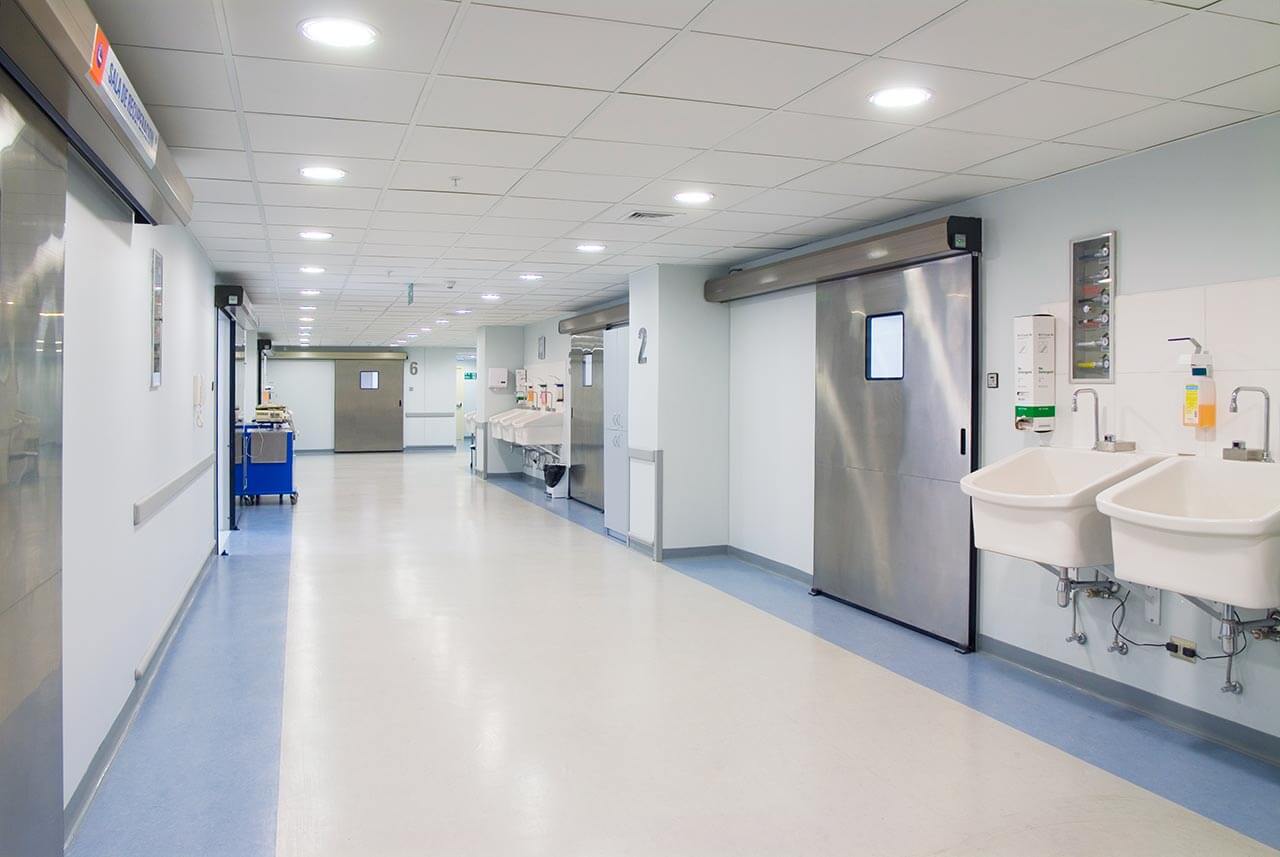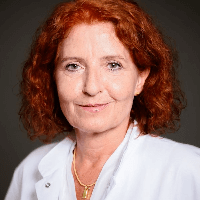
The program includes:
- Initial presentation in the clinic
- clinical history taking
- review of medical records
- physical examination
- laboratory tests:
- complete blood count
- biochemical analysis of blood
- inflammation indicators (CRP, ESR)
- TSH-basal, fT3, fT4
- indicators of blood coagulation
- CT planning of radiation therapy
- full course of conventional radiation therapy
- symptomatic treatment
- cost of essential medicines and materials
- nursing services
- control examinations
- consultations of related specialists
How program is carried out
During the first visit, the doctor will conduct a clinical examination and go through the results of previous laboratory tests and instrumental examinations. After that, you will undergo an additional examination, including complete blood count, laboratory assessment of liver and kidney function. Based on the received results, the physician will conduct radiotherapy planning with the help of CT or MRI, make the permanent tattoo marks on the skin and conduct CT simulation in order to assess the accuracy of the rays and the radiation dose. If necessary, related medical specialists will be involved in the elaboration of a treatment regimen (tumor board).
Radiation therapy is carried out as the day hospital procedure, without mandatory admission to the hospital. At each visit, the physician will assess your general condition and the marks on the skin. After that, you will be placed in a shielded radiation therapy room, on a special table.
Each radiation therapy session lasts less than half an hour (including preparation). All this time, doctors and nurses are monitoring your condition, you can communicate with them through a loudspeaker. The procedure is completely painless. Depending on the planned course of treatment, you will visit the hospital from 1 to 3-5 times a week.
After the completion of the radiation therapy course, you will undergo control examinations aimed at assessing your condition and efficacy of treatment. After that you will receive the medical report with detailed recommendations regarding further follow-up and treatment. In the future, you will be able to have a distant consultation with your attending physician and schedule the next course of treatment, if necessary.
Required documents
- Medical records
- MRI/CT scan (not older than 3 months)
- Biopsy results (if available)
Service
You may also book:
 BookingHealth Price from:
BookingHealth Price from:
About the department
The Department of Radiation Oncology and Radiation Therapy at the Alfried Krupp Hospital in Essen-Ruettenscheid specializes in various types of modern radiation therapy. The team of the department's doctors admits patients with malignant and benign tumors, as well as with certain degenerative diseases. During consultations, specialists tell patients in detail about the types of radiation therapy, the benefits and risks of a particular type of irradiation. The medical facility has an excellent technical base, so it offers innovative radiation techniques such as intensity-modulated radiation therapy (IMRT) and stereotactic radiation therapy. In most cases, radiation therapy is performed on an outpatient basis, but patients receiving chemoradiotherapy and patients with particularly complex clinical cases still require hospitalization. Each treatment regimen is carefully planned according to the patient's clinical data, and therefore doctors achieve an optimal therapeutic effect. After completing the course of treatment, patients are advised to undergo regular follow-up examinations. The Chief Physician of the department is Dr. med. Birgit Jäger.
The pride of the department is high-tech equipment of the latest generation. The medical facility has Elekta Synergy and Artiste Linaс linear accelerators with a multileaf collimator and built-in ConeBeamCT, Somatom Emotion DUO computed tomography system, Theraplan Plus Verson 3.75 and Oncentra V1.4 irradiation planning devices, M3 micro-multileaf collimator BrainScan V 5.3, Exac Trac1 High-Dose patient positioning system and many other advanced devices that provide effective irradiation with minimal harm to healthy tissues.
Primary attention in the department's clinical practice is paid to the treatment of malignant solid tumors of various localizations, including breast cancer, lung cancer, ENT cancer, cancer of the female and male reproductive system, gastrointestinal cancer, nervous system cancer, skin cancer, etc. The department's radiation therapists also perform irradiation of patients with leukemia (as part of multimodal therapy). Brain cancer and brain metastases are treated with stereotactic radiation therapy, which is a modern method allowing for a targeted delivery of a high dose of radiation to the pathological focus without damaging healthy tissues.
The competence of doctors working in the medical facility also includes the treatment of benign diseases. The therapeutic offer includes irradiation of patients with particular inflammatory, degenerative, hyperproliferative and functional diseases. Irradiation for benign conditions is often used to relieve pain. Radiation therapy can also slow down the growth of active benign neoplasms. Irradiation planning for benign diseases is just as important as for oncology, so specialists always pay due attention to the planning of upcoming therapy.
The department specializes in the treatment of the following diseases:
- Malignant diseases
- Breast cancer
- Uterine, cervical, ovarian, vulvar cancer
- Prostate and testicular cancer
- Kidney cancer
- Bladder cancer
- Gastrointestinal cancer (stomach, bowel, esophageal cancer, etc.)
- Cancer of the lungs and other respiratory organs
- Skin cancer
- ENT cancer
- Brain and spinal cord cancer
- Lymphomas
- Sarcomas
- Leukemias
- Benign diseases
- Inflammatory diseases
- Acute and chronic inflammation, as well as recurrent abscesses of the sweat glands
- Boils and carbuncles
- Subungual felon (nail bed inflammation)
- Degenerative diseases
- Tendinopathy
- Periarthropathia humeroscapularis
- Epicondylitis humeri radialis
- Calcanodyne and heel spur
- Degenerative joint diseases accompanied by severe pain
- Coxarthrosis, gonarthrosis, omarthrosis, polyarthrosis and rhizarthrosis
- Hyperproliferative diseases
- Dupuytren's contracture (early stages)
- Peyronie's disease (early stages)
- Keloid and pterygium (prevention of relapse after surgery)
- Functional diseases
- Gynecomastia
- Endocrine ophthalmopathy
- Age-related macular degeneration
- Lymphatic fistulas
- Heterotopic ossification of the large joints (radiation therapy is carried out for prophylactic purposes)
- Benign lesions and neoplasms of the brain: meningioma, acoustic neuroma, pituitary adenoma, angioma, vascular malformations
- Other benign diseases
- Pigmented villonodular synovitis
- Bone hemangioma
- Skin diseases (for example, eczema, keratoses, hard-to-reach pathological foci of basalioma, psoriasis)
- Inflammatory diseases
- Other malignant and benign pathologies
The department's range of therapeutic services includes:
- External beam radiation therapy for therapeutic and palliative purposes (as part of multimodal therapy and as monotherapy)
- Respiratory-gated radiation therapy (for breast cancer to protect the myocardium)
- Intensity-modulated radiation therapy (IMRT)
- Image-guided radiation therapy (IGRT)
- Stereotactic radiation therapy for the treatment of brain tumors and brain metastases
- Other types of radiation therapy
Photo of the doctor: (c) Alfried Krupp Krankenhaus
About hospital
The Alfried Krupp Hospital in Essen-Ruettenscheid began its work back in 1870, and large-scale restoration took place here in 1980. The medical facility is an academic hospital of the University of Duisburg-Essen, thanks to which it has access to innovations in the medical field, and also makes its own contribution to the development of modern therapeutic techniques. The hospital has 13 departments and various highly specialized centers, including the Breast Center, Endoprosthetics Center, Lung Cancer Center, Trauma Center and others. The hospital has 575 beds for patient hospitalization. The hospital also offers outpatient medical care. Every year, the hospital's team of doctors admits over 80,000 patients for diagnostics and treatment. For many years, the medical facility has held a leading position in the German medical arena, and is also widely known for its high quality standards in many other countries of the world. The hospital can be proud of its successful experience in providing medical care to foreign patients.
The priority fields of the hospital's work include the treatment of oncological, hematological, gastroenterological, gynecological, urological, neurological, orthopedic and other diseases. The high quality standards of medical care are facilitated by the constant updating of medical equipment and advanced training courses for medical personnel. The hospital widely applies modern methods of conservative treatment, progressive laparoscopic surgical techniques, as well as innovative robotic surgery using the da Vinci Xi system.
The medical facility has been awarded numerous quality certificates confirming the outstanding clinical work of its specialists. These include, in particular, a certificate of the German Society for General and Visceral Surgery (DGAV) in the field of bariatric surgery, colorectal surgery, pancreatic surgery and minimally invasive surgery, an endoCert certificate in the field of joint replacement surgery, a certificate of the German Cardiac Society (DGK) in the field of emergency cardiac care, a certificate of the German Cancer Society (DKG) in the treatment of prostate and lung cancer, a certificate of the German Stroke Society, a certificate of the German Society of Phlebology and others.
Special attention should be paid to the exceptional professionalism of the doctors working at the hospital, who apply all their rich experience and deep knowledge to restore the health of patients. The specialists use an individual approach in their work and carefully think over each treatment regimen so that the patient gets the maximum result, but at the same time the course of therapy is as sparing as possible. The hospital's team of doctors keeps pace with the very latest medical advances and actively implements them into clinical practice for the benefit of patients.
Photo: (с) depositphotos
Accommodation in hospital
Patients rooms
The patients of the Alfried Krupp Hospital in Essen-Ruettenscheid live in comfortable single and double rooms with light colors. For maximum convenience, each patient room has an ensuite bathroom with shower and toilet. The patient room includes a comfortable automatically adjustable bed with an orthopedic mattress, a bedside table, a wardrobe, a table and chairs, as well as a TV and a telephone. Wi-Fi is available upon request.
The hospital also offers enhanced-comfort rooms corresponding to the level of an upscale hotel room. Such patient rooms additionally include upholstered furniture, a safe, a minifridge, and an air conditioner. Daily fresh newspapers, seasonal fruits, coffee and tea are offered to the patient in the room (upon request).
Meals and Menus
The patients of the hospital are offered delicious meals three times a day. Breakfast and dinner are served buffet style with a wide selection of cheese, cold meats, vegetables, fruits, pastries, etc. For lunch, there is a choice of several set menus. The patients living in an enhanced-comfort room benefit from a separate menu for breakfast, lunch and dinner with a large assortment of delicious dishes.
Further details
Standard rooms include:
Religion
The services of representatives of religions are available upon request.
Accompanying person
During an inpatient program, an accompanying person can stay with you in the patient room or in a hotel of your choice.
Hotel
During an outpatient program, you can stay in a hotel of your choice. The managers will help you choose the most suitable options.
